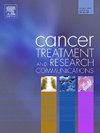Exploring the prognostic significance of vitamin D deficiency in pancreatic cancer: Disease progression and survival outcomes
IF 2.4
Q3 Medicine
引用次数: 0
Abstract
Background
Pancreatic cancer remains one of the most aggressive malignancies with limited treatment options and poor survival rates. Vitamin D deficiency has been suggested to influence cancer progression and survival outcomes in various malignancies.
Aim
This study aimed to investigate the association between Vitamin D deficiency and disease progression as well as survival in patients diagnosed with pancreatic cancer.
Methods
A retrospective cohort study was conducted, including 151 patients diagnosed with pancreatic cancer between 2012 and 2022. Serum Vitamin D levels at the time of diagnosis were measured. Disease progression was evaluated through radiological assessments and clinical reports. Survival outcomes, including overall survival (OS) and progression-free survival (PFS), were analyzed using Kaplan-Meier survival curves and Cox proportional hazards regression models.
Results
Of the 151 patients, 84 (56 %) were identified as Vitamin D deficient at the time of diagnosis. The deficient group exhibited a significantly higher frequency of advanced-stage disease (stages III and IV) compared to the non-deficient group (p < 0.05). During the follow-up period, 66 (78.6 %) of Vitamin d-deficient patients and 56 (84.8 %) of non-deficient patients experienced disease progression (p = 0.51). Moreover, Kaplan-Meier analysis showed a non-significant trend toward shorter median PFS (8.95 months vs. 9.27 months, p = 0.51) and OS (17.64 months vs. 19.05 months, p = 0.616) in the Vitamin d-deficient group.
Conclusion
Vitamin D deficiency is prevalent among patients with pancreatic cancer and appears to be associated with more advanced disease at diagnosis. Although a trend toward poorer survival outcomes was observed, the association between Vitamin D deficiency and OS/PFS did not reach statistical significance. Additional prospective studies are needed to confirm these findings and explore potential benefits of Vitamin D supplementation in pancreatic cancer management.
探讨胰腺癌中维生素D缺乏的预后意义:疾病进展和生存结果
胰腺癌仍然是最具侵袭性的恶性肿瘤之一,治疗选择有限,生存率低。维生素D缺乏被认为会影响各种恶性肿瘤的癌症进展和生存结果。目的本研究旨在探讨维生素D缺乏与胰腺癌患者疾病进展和生存之间的关系。方法采用回顾性队列研究,纳入2012 - 2022年诊断为胰腺癌的151例患者。测定诊断时血清维生素D水平。通过放射学评估和临床报告评估疾病进展。生存结果,包括总生存期(OS)和无进展生存期(PFS),使用Kaplan-Meier生存曲线和Cox比例风险回归模型进行分析。结果151例患者中,84例(56%)在诊断时被确定为维生素D缺乏。与非缺陷组相比,缺陷组出现晚期疾病(III期和IV期)的频率明显更高(p <;0.05)。在随访期间,66例(78.6%)维生素d缺乏患者和56例(84.8%)非维生素d缺乏患者出现疾病进展(p = 0.51)。此外,Kaplan-Meier分析显示,维生素d缺乏组中位PFS(8.95个月对9.27个月,p = 0.51)和OS(17.64个月对19.05个月,p = 0.616)缩短的趋势不显著。结论维生素D缺乏症在胰腺癌患者中普遍存在,且在诊断时与病情进展有关。虽然观察到较差的生存结果趋势,但维生素D缺乏与OS/PFS之间的关联没有统计学意义。需要进一步的前瞻性研究来证实这些发现,并探索补充维生素D在胰腺癌治疗中的潜在益处。
本文章由计算机程序翻译,如有差异,请以英文原文为准。
求助全文
约1分钟内获得全文
求助全文
来源期刊

Cancer treatment and research communications
Medicine-Oncology
CiteScore
4.30
自引率
0.00%
发文量
148
审稿时长
56 days
期刊介绍:
Cancer Treatment and Research Communications is an international peer-reviewed publication dedicated to providing comprehensive basic, translational, and clinical oncology research. The journal is devoted to articles on detection, diagnosis, prevention, policy, and treatment of cancer and provides a global forum for the nurturing and development of future generations of oncology scientists. Cancer Treatment and Research Communications publishes comprehensive reviews and original studies describing various aspects of basic through clinical research of all tumor types. The journal also accepts clinical studies in oncology, with an emphasis on prospective early phase clinical trials. Specific areas of interest include basic, translational, and clinical research and mechanistic approaches; cancer biology; molecular carcinogenesis; genetics and genomics; stem cell and developmental biology; immunology; molecular and cellular oncology; systems biology; drug sensitivity and resistance; gene and antisense therapy; pathology, markers, and prognostic indicators; chemoprevention strategies; multimodality therapy; cancer policy; and integration of various approaches. Our mission is to be the premier source of relevant information through promoting excellence in research and facilitating the timely translation of that science to health care and clinical practice.
 求助内容:
求助内容: 应助结果提醒方式:
应助结果提醒方式:


